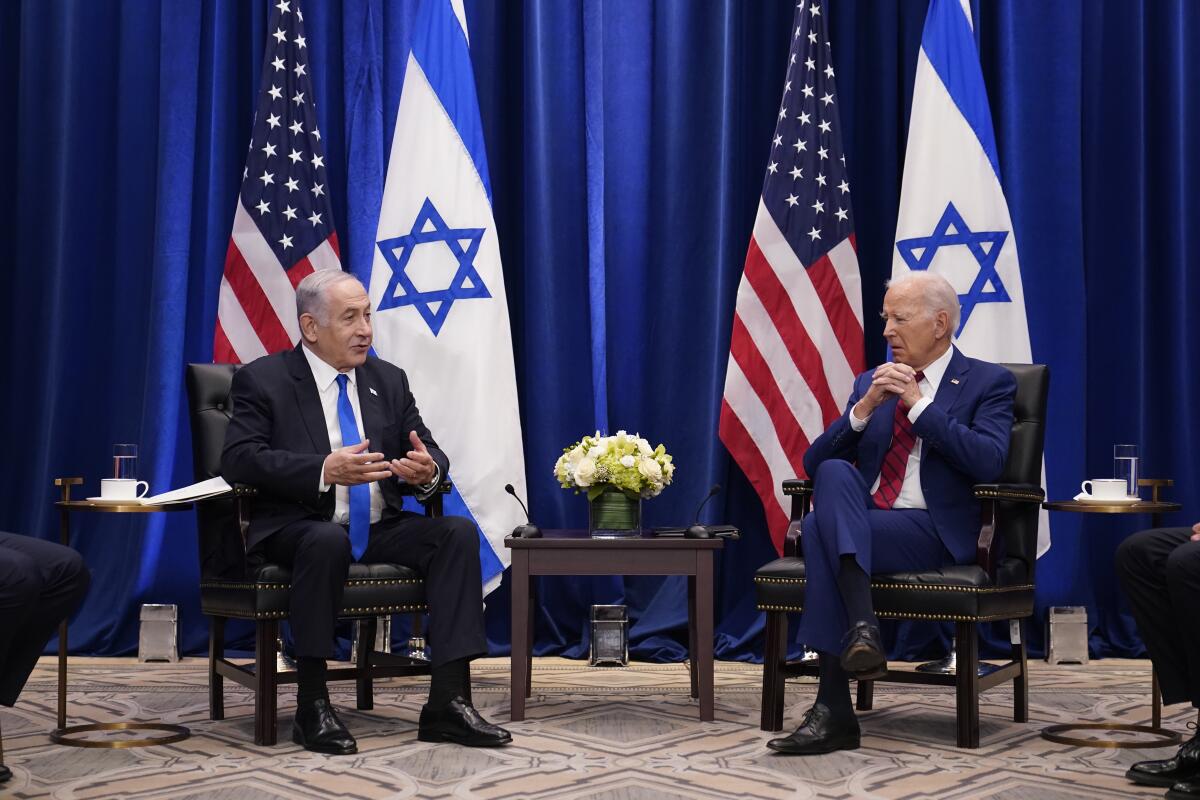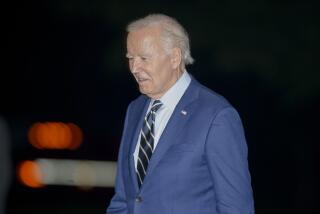Netanyahu finally gets a meeting with Biden — but not at the White House

- Share via
NEW YORK — Ending a prolonged snub, President Biden held a “very candid” meeting with Israeli Prime Minister Benjamin Netanyahu on Wednesday, welcoming possible rapprochement between Israel and Saudi Arabia and cautioning him to preserve democracy at home.
The meeting pointedly did not take place at the White House, as Netanyahu would have preferred, but in a New York hotel on the margins of the annual United Nations General Assembly, which both leaders were attending this week.
“Today, we’re going to discuss some of the hard issues,” Biden said ahead of the session, seated with the Israeli prime minister in front of an array of flags from both countries. The topics to be covered, he said, were “upholding democratic values that lie at the heart of our partnership, including the checks and balances in our systems and preserving the path to a negotiated two-state solution, and ensuring that Iran never, never acquires a nuclear weapon.”
The president was alluding to Netanyahu’s efforts to overhaul the Israeli judiciary in ways that many in that country say would undermine democracy and gut one of the few balances of political power there. The move has triggered massive demonstrations for months. Biden has urged Netanyahu and his coalition government to seek consensus instead of pushing ahead with such unpopular measures, but to little avail.
Biden also referred to the importance of an independent Palestinian nation — the two-state solution — hopes for which have all but vanished with the arrival of Israel’s most right-wing and nationalistic government to date.
A senior Biden administration official, who briefed reporters after the meeting on condition of anonymity in keeping with White House protocols, described the session as “very constructive, very candid — [and] ultimately, we hope, productive.”
Netanyahu emphasized ongoing talks to open diplomatic ties between Israel and Saudi Arabia, an extension of the Abraham Accords brokered during the Trump administration in which a handful of Arab and Muslim countries formally recognized Israel. Before then, Egypt and Jordan were the only countries in the Middle East that did.
“I think that under your leadership, Mr. President, we can forge a historic peace between Israel and Saudi Arabia,” Netanyahu said. “And I think such a peace would go a long way for us to advance the end of the Arab Israeli conflict, achieve reconciliation between the Islamic world and the Jewish state, and advance a genuine peace between Israel and the Palestinians.”
Biden added: “If you and I 10 years ago were talking about normalization with Saudi Arabia, I think we’d look at each other like, ‘Who’s been drinking what?’”
But privately, U.S. officials remain cautious about a normalization deal, saying it has a long way to go. Saudi Arabia has a formidable list of asks, including assistance with a civilian nuclear energy program and a security pact that would include a NATO-style commitment that the U.S. will go to Saudi Arabia’s defense in case of attack.
The Saudis also insist that improvements be made in the plight of the Palestinians, several million of whom live under Israeli military occupation.
The senior official said “it was understood” by Netanyahu that an agreement on the Palestinians would have to be part of any Saudi rapprochement deal, but declined to go into details.
“Nobody has ever said this is right around the corner,” the official said of normalization. “We’ve worked on this for some time. We have been making some progress, but ... there’s some ways to travel on this before we get there.”
Breaking with tradition, Biden did not invite Netanyahu to the White House immediately after his inauguration in January 2021. At the time, Netanyahu had been out of power for several months, returning last December. Still, there has been no invitation. Administration officials said the intent was to show disapproval for some of the moves the Netanyahu government was making. In addition to the judicial changes, some members of his Cabinet have a history of espousing anti-Arab racist rhetoric and inciting violence.
This has coincided with an outbreak of gang violence by Jewish settlers in the West Bank, attacking Palestinians and their homes, in addition to shootings and bombings by Palestinian militant groups targeting Israelis.
U.S. officials have repeatedly voiced alarm at the surge in violence, but have done little to stop it. The last year has been one of the deadliest in a decade, mostly for Palestinians.
Protesters, many from Israel and waving Israeli flags, have dogged Netanyahu at his appearances in New York, including outside of the Biden meeting. They are protesting the attempt to take away power from the Israeli Supreme Court, which some critics see as Netanyahu’s way to escape his own prosecution on corruption charges.
With Biden, Netanyahu seemed to downplay the concerns many people have over the judicial overhaul and other steps critics see as anti-democratic, including inserting Orthodox Judaism increasingly into public life. But he insisted “one thing will never change: ... Israel’s commitment to democracy.”
On Iran, both governments, along with Saudi Arabia, have broad agreement on the need to contain that country’s nuclear program. It was largely frozen under the 2015 international Iran nuclear agreement signed by then-President Obama and five other countries. But then-President Trump pulled out of the deal in 2018, and Iran has steadily increased its enrichment of uranium, a key step in building nuclear bombs.
“That shared goal of ours [to prevent Iran from obtaining a nuclear weapon] can be best achieved by a credible military threat, crippling sanctions and supporting the brave men and women of Iran who despise that regime and who are our real partners for a better future,” Netanyahu said.
Biden and Netanyahu noted that they have known each other for 40 years, dating to when they were just starting their political and diplomatic careers.
Despite his decision to shut out Netanyahu for months, Biden made a point of saying that his loyalty to Israel was unbending.
“Even where we have some differences, my commitment to Israel, you know, is ironclad,” Biden said. “I think without Israel, there’s not a Jew in the world who is secure. Israel is essential.”
More to Read
Get the L.A. Times Politics newsletter
Deeply reported insights into legislation, politics and policy from Sacramento, Washington and beyond. In your inbox twice per week.
You may occasionally receive promotional content from the Los Angeles Times.











